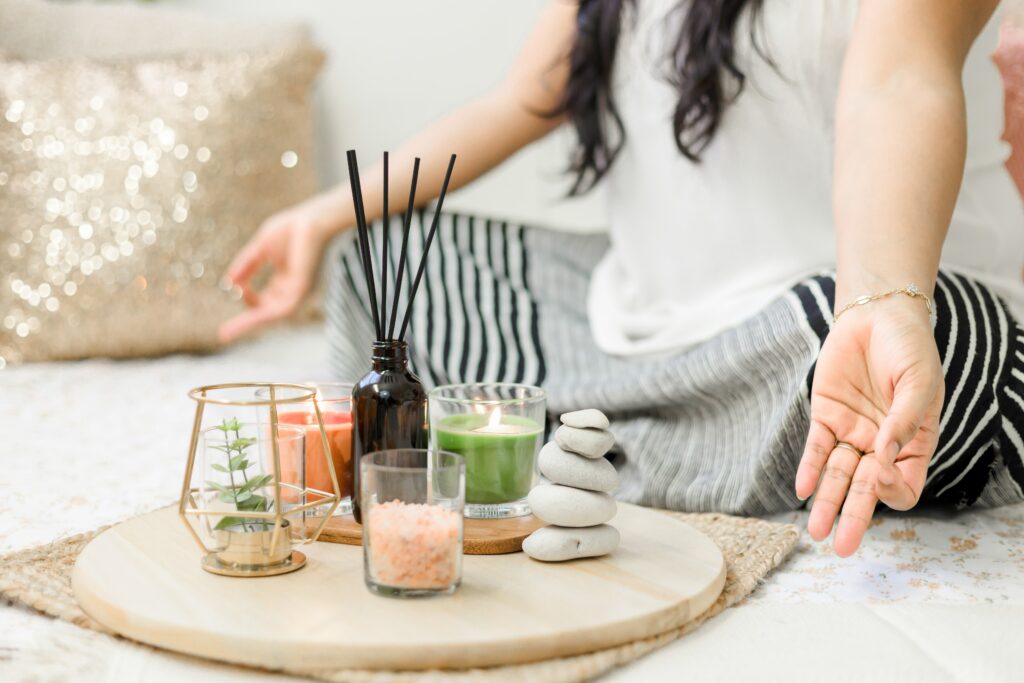
Mindfulness practices have become increasingly popular in recent years, with people seeking ways to reduce stress, anxiety, and improve their overall well-being. Mindfulness involves paying attention to the present moment, without judgment or distraction. It is a simple yet effective way to cultivate inner peace and beauty in our lives.
One of the benefits of mindfulness is that it helps us become more aware of our thoughts and emotions. By observing our thoughts and feelings without judgment, we can learn to accept them and let them go, rather than getting caught up in them. This can lead to a sense of inner calm and peace, as we become less reactive to the ups and downs of life.
Research has shown that mindfulness practices can also have physical benefits, such as reducing inflammation in the body and improving immune function. In addition, mindfulness can improve our relationships with others, as we become more present and attentive in our interactions. By incorporating mindfulness practices into our daily routine, we can cultivate a sense of inner peace and beauty that radiates outward into all aspects of our lives.
Understanding Mindfulness
Mindfulness is a practice that involves being present and fully engaged in the present moment. It is a state of awareness that allows us to observe our thoughts, feelings, and sensations without judgment. Mindfulness is rooted in Buddhist philosophy and has been practiced for thousands of years.
The word “mindfulness” comes from the Sanskrit word “smriti,” which means “to remember.” In Buddhism, mindfulness is one of the seven factors of enlightenment and is considered essential for achieving enlightenment. However, you don’t have to be a Buddhist to practice mindfulness.
Mindfulness can be practiced in many different ways, including meditation, breathing exercises, and body scans. The goal of mindfulness is to cultivate a sense of inner peace and clarity by focusing on the present moment and letting go of distractions and worries.
Research has shown that mindfulness can have many benefits, including reducing stress and anxiety, improving sleep quality, and increasing feelings of happiness and well-being. It can also help improve cognitive function, such as memory and attention.
In conclusion, mindfulness is a powerful practice that can help us cultivate inner peace and beauty. By being present and fully engaged in the present moment, we can let go of distractions and worries and experience a sense of calm and clarity. Mindfulness has its roots in Buddhist philosophy, but it can be practiced by anyone, regardless of their religious or spiritual beliefs.
Benefits of Mindfulness
Mindfulness is a practice that involves focusing on the present moment and accepting it without judgment. It has been shown to have numerous benefits for mental and physical health. Here are some of the benefits of mindfulness:
Stress Reduction
Mindfulness has been shown to reduce stress levels. By focusing on the present moment and accepting it without judgment, individuals can reduce the impact of stress on their lives. This can lead to improved mental and physical health.
Anxiety and Depression
Mindfulness has been shown to be effective in reducing symptoms of anxiety and depression. It can help individuals become more aware of their thoughts and emotions, and learn to accept them without judgment. This can lead to improved mental health and a reduction in symptoms of anxiety and depression.
Well-being and Happiness
Mindfulness has been shown to improve overall well-being and happiness. By focusing on the present moment and accepting it without judgment, individuals can become more aware of the positive aspects of their lives. This can lead to increased feelings of happiness and well-being.
Life Satisfaction and Relationship Satisfaction
Mindfulness has been shown to improve both life satisfaction and relationship satisfaction. By becoming more aware of the present moment and accepting it without judgment, individuals can become more present in their relationships and appreciate the positive aspects of their lives. This can lead to increased satisfaction with both life and relationships.
Empathy and Resilience
Mindfulness has been shown to improve empathy and resilience. By becoming more aware of their thoughts and emotions, individuals can become more empathetic towards others. Additionally, mindfulness can help individuals develop the resilience needed to cope with difficult situations.
Overall, mindfulness has numerous benefits for mental and physical health. It can lead to reduced stress, improved mental health, increased happiness and well-being, and improved relationships. By practicing mindfulness regularly, individuals can improve their overall quality of life.
Mindfulness Practices
Practicing mindfulness can help you find inner peace and beauty. Mindfulness is the practice of being present in the moment and paying attention to your thoughts, feelings, and sensations without judgment. Here are some mindfulness practices that can help you achieve inner peace and beauty:
Meditation
Meditation is a powerful tool for achieving mindfulness. By focusing your attention on your breath or a mantra, you can quiet your mind and become more aware of the present moment. You can practice meditation on your own or use guided meditation apps or videos.
Mindfulness Meditation
Mindfulness meditation is a type of meditation that focuses on being present in the moment and observing your thoughts and feelings without judgment. It can help you become more aware of your emotions and develop a greater sense of compassion for yourself and others.
Exercises
Mindful exercises, such as yoga and tai chi, can help you become more focused and present in the moment. These exercises can also help you become more aware of your body and its sensations.
Journaling
Journaling is a great way to become more mindful of your thoughts and feelings. By writing down your thoughts and emotions, you can become more aware of them and gain insight into your inner world.
Breathing
Breathing exercises can help you become more focused and centered. By focusing on your breath, you can quiet your mind and become more aware of your body and its sensations.
Walking
Mindful walking is a great way to become more present in the moment and connect with your surroundings. By focusing on your footsteps and the sensations in your body, you can become more aware of the present moment.
Guided Meditation
Guided meditation can be a helpful tool for achieving mindfulness. By listening to a guided meditation, you can focus your attention and become more aware of the present moment.
Mindful Eating
Mindful eating is the practice of paying attention to your food and the sensations in your body while you eat. By savoring each bite and being present in the moment, you can become more aware of your body’s hunger and fullness signals.
In conclusion, mindfulness practices have been shown to be effective in promoting inner peace and beauty. By cultivating mindfulness, individuals can develop a greater awareness of their thoughts and emotions, and learn to respond to them in a more constructive and positive way. Mindfulness meditation is a technique that can be used to alleviate stress, enhance resilience, and put oneself on the path toward inner peace.
Research has shown that mindfulness practices can help reduce symptoms of anxiety, depression, and stress. By focusing on the present moment and accepting it without judgment, individuals can learn to let go of negative thoughts and emotions and cultivate a sense of inner calm. This can lead to a greater sense of well-being and overall life satisfaction.
Moreover, mindfulness practices can help individuals develop a greater appreciation for the beauty in the world around them. By learning to be more present and attentive, individuals can develop a deeper connection to nature, art, and other sources of beauty. This can lead to a greater sense of awe and wonder, and a more profound appreciation for the richness of life.
Overall, mindfulness practices are a valuable tool for promoting inner peace and beauty. By cultivating mindfulness, individuals can learn to live more fully in the present moment, and develop a greater sense of connection to themselves, others, and the world around them.
